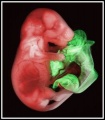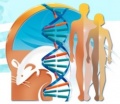File:Genetics.jpg: Difference between revisions
(Mouse Resequencing and SNP Discovery Project Completed A recently completed DNA sequencing of the 15 mouse strains most commonly used in biomedical research showed that there were more than 8.3 million single nucleotide polymorphisms (SNPs) in their geno) |
(uploaded a new version of "File:Genetics.jpg": Image of Transgenic Mouse Embryo Wins Nikon Small World Photomicrography Competition. Nikon Small World Photomicrography Competition 1st place winner: Double transgenic mouse embryo, 18.5 days, shot b) |
(No difference)
| |
Latest revision as of 12:55, 24 September 2009
Mouse Resequencing and SNP Discovery Project Completed
A recently completed DNA sequencing of the 15 mouse strains most commonly used in biomedical research showed that there were more than 8.3 million single nucleotide polymorphisms (SNPs) in their genomes. These data will help researchers understand and possibly identify potential therapeutic targets in variety of diseases such as Parkinson's, cancer, diabetes, heart and lung diseases, reproductive diseases, and asthma and other childhood diseases, which are affected by exposure to environmental substances.
File history
Yi efo/eka'e gwa ebo wo le nyangagi wuncin ye kamina wunga tinya nan
| Gwalagizhi | Nyangagi | Dimensions | User | Comment | |
|---|---|---|---|---|---|
| current | 12:55, 24 September 2009 |  | 262 × 300 (11 KB) | Z3252231 (talk | contribs) | Image of Transgenic Mouse Embryo Wins Nikon Small World Photomicrography Competition. Nikon Small World Photomicrography Competition 1st place winner: Double transgenic mouse embryo, 18.5 days, shot by Gloria Kwon of Memorial Sloan-Ketterin Institute. |
| 12:49, 24 September 2009 |  | 250 × 217 (20 KB) | Z3254857 (talk | contribs) | Mouse Resequencing and SNP Discovery Project Completed A recently completed DNA sequencing of the 15 mouse strains most commonly used in biomedical research showed that there were more than 8.3 million single nucleotide polymorphisms (SNPs) in their geno |
You cannot overwrite this file.
File usage
The following file is a duplicate of this file (more details):
There are no pages that use this file.